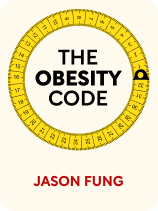

This article is an excerpt from the Shortform book guide to "The Obesity Code" by Jason Fung. Shortform has the world's best summaries and analyses of books you should be reading.
Like this article? Sign up for a free trial here .
Why shouldn’t we blame obese patients for being dangerously overweight? Is obesity a choice or a disease?
To answer this question, we must first understand the root cause of obesity. If obesity is caused solely by eating too much, then we could indeed attribute it to personal choice. However, the prevailing view of obesity as a problem of uncontrolled eating is simplistic and limited. Ultimately, obesity is a hormonal disorder.
Here’s why obesity is a disease rather than a problem of self-control.
Jason Fung: Obesity Is a Hormonal Problem
Is obesity a choice or a disease? In his book The Obesity Code, Jason Fung argues that obesity is a hormonal problem that causes overeating and weight gain, rather than a problem of willpower or self-control.
Today, the prevailing view holds that obesity is a problem of calories in, calories out. Established decades ago, this orthodox view suggests that weight gain results from eating too much and exercising too little. So, Fung says, experts pushed the “eat less, move more” program on the American public.
On a technical level, we define obesity according to body mass index (BMI). BMI is a ratio of your height compared to your weight—that is, it approximates how wide you are compared to how tall you are. A ratio over 30 is considered obesity.
(Shortform note: While BMI has its uses, it has also received criticism for being an overly simplistic model of weight and health. Among other things, BMI measurements fail to account for body composition (how much fat versus muscle you have), age (it doesn’t work for kids under age 20), and differences in bone mass. Additionally, BMI fails to account for ethnic differences—for instance, South Asians tend to have a higher proportion of fat at a given BMI, while people of African heritage tend to have a higher proportion of muscle at that same BMI.)
The Prevailing Model Has Failed
Fung argues that the “calories in, calories out” theory fails to capture the full picture of obesity. Excess calories play a part, but they aren’t the root cause of obesity. More specifically, this theory fails to understand that obesity is a hormonal disease, rather than a problem of willpower or bad eating habits.
(Shortform note: Fung is not the first person to point out that “calories in, calories out” is flawed. In Why We Get Fat, science journalist Gary Taubes argues that because it’s an intuitive model—eat more, get fat; eat less, lose weight—we’ve resisted the possibility that it’s wrong. Taubes suggests that the medical establishment has failed the public by adhering to this paradigm and that people aren’t to blame for struggling with obesity.)

———End of Preview———
Like what you just read? Read the rest of the world's best book summary and analysis of Jason Fung's "The Obesity Code" at Shortform .
Here's what you'll find in our full The Obesity Code summary :
- Why everything we were taught about obesity is wrong
- The theory of obesity as a hormonal disorder that causes overeating
- Why dieting doesn’t work and exercise actually has little impact on weight loss






